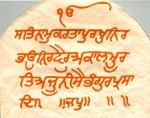Template:AOW42: Difference between revisions
Hari singh (talk | contribs) No edit summary |
Hari singh (talk | contribs) No edit summary |
||
| (One intermediate revision by the same user not shown) | |||
| Line 1: | Line 1: | ||
{{aowh|[[Mool Mantar]]}} | {{aowh|[[Mool Mantar]]}} | ||
{{pm|Image:Moolmantar guruarjan.jpg|[[Mool Mantar]] in the handwriting of [[Guru Arjan Dev]] from the Kartarpuri Bir}} | |||
[[ | '''[[Mool Mantar]]''' is the most important composition contained within the [[Sri Guru Granth Sahib]]; it is the basis of [[Sikhism]]. It’s importance is emphasised by the fact that it is the first composition to appear in the [[holy Granth]] and that it appears before the commencement of most of the [[Raag]] section within this sacred volume.<br> | ||
'''[[ | <u>'''[[Gurmukhi|Original Gurmukhi Text]]:<br>'''</u><br> | ||
<big> ੴ ਸਤਿ ਨਾਮੁ ਕਰਤਾ ਪੁਰਖੁ ਨਿਰਭਉ ਨਿਰਵੈਰੁ ਅਕਾਲ ਮੂਰਤਿ ਅਜੂਨੀ ਸੈਭੰ ਗੁਰ ਪ੍ਰਸਾਦਿ ॥... ॥ </big> {{Audioplay|Mool_mantar.mp3}} | |||
The [[Mool Mantar]] is said to be the first composition uttered by [[Guru Nanak Dev]] upon [[3 Days in the River|enlightenment]] at the age of about 30. Being the basis of [[Sikhism]], it encapsulates the entire theology of this faith, and as a result, it is also the most difficult composition to fully understand. | |||
The [[ | The succeeding [[bani]] called the [[Japji Sahib]] and the rest of the sacred Granth totalling 1430 pages, are efforts to explain that which is contained within the [[Mool Mantar]]. <!--- | ||
This is the verse that all beginners to [[Sikhism]] have to learn and repeat over and over again until it becomes an automatic process. After learning this short verse and its full meaning, it is common for beginners to awake early in the morning, wash and sit and mediate on the [[Mantar]] for 10 to 20 minutes focussing on the sound and meaning of each word. | This is the verse that all beginners to [[Sikhism]] have to learn and repeat over and over again until it becomes an automatic process. After learning this short verse and its full meaning, it is common for beginners to awake early in the morning, wash and sit and mediate on the [[Mantar]] for 10 to 20 minutes focussing on the sound and meaning of each word.---> {{aowf|Mool Mantar}} | ||
Latest revision as of 20:43, 3 June 2012

Mool Mantar is the most important composition contained within the Sri Guru Granth Sahib; it is the basis of Sikhism. It’s importance is emphasised by the fact that it is the first composition to appear in the holy Granth and that it appears before the commencement of most of the Raag section within this sacred volume.
Original Gurmukhi Text:
ੴ ਸਤਿ ਨਾਮੁ ਕਰਤਾ ਪੁਰਖੁ ਨਿਰਭਉ ਨਿਰਵੈਰੁ ਅਕਾਲ ਮੂਰਤਿ ਅਜੂਨੀ ਸੈਭੰ ਗੁਰ ਪ੍ਰਸਾਦਿ ॥... ॥ ![]() Play Audio
Play Audio
The Mool Mantar is said to be the first composition uttered by Guru Nanak Dev upon enlightenment at the age of about 30. Being the basis of Sikhism, it encapsulates the entire theology of this faith, and as a result, it is also the most difficult composition to fully understand.
The succeeding bani called the Japji Sahib and the rest of the sacred Granth totalling 1430 pages, are efforts to explain that which is contained within the Mool Mantar. .....More
